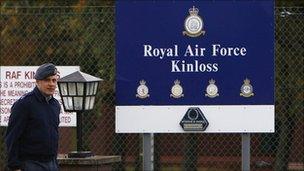Moray 'to keep military footprint'
- Published

RAF Kinloss is set to effectively close after the government cancelled the order for new Nimrods
Moray in north-east Scotland should retain a military presence, even if it loses its two airbases, according to Defence Secretary Liam Fox.
He said areas with a military "footprint" should retain it, and said he was committed to continue having a military presence spread around the UK.
RAF Kinloss is to close following the decision to cancel new Nimrod aircraft.
Nearby RAF Lossiemouth's future is also at risk, pending a decision on where to base a reduced Tornado bomber fleet.
A leaked document, apparently from the Ministry of Defence, suggests RAF Marham in Norfolk is at an advantage because it has more engineering facilities already based there.
The government is bringing German-based army units back to the UK over the next ten years, and air bases could be used for them.
Asked about the future of RAF Lossiemouth, Dr Fox said: "No decision's been made yet. What I am keen to do is to ensure that any part of the country that has a defence footprint at the moment retains one.
"Whether it will be RAF changing to the Army as we move the Army back from Germany is all to be discussed over the coming months.
"But I am very keen that not only we try to retain the military presence, with all that means in support for the local economy, but I'm also intent that we retain the United Kingdom forces with a wide footprint across the whole of the union."
US discussions
During a visit to Glasgow, to see work on aircraft carriers being partially built at Govan shipyard, Dr Fox said the loss of maritime surveillance aircraft was being followed by "constant review" of the role Nimrods would otherwise be taking on.
"I've already had discussions with the United States about what we would do if we did require to have that capability back," he said.
"But I was faced with a Nimrod project where we had already spent £3.8bn of taxpayers' money, it was 10 years late and they still couldn't guarantee a date when it would come in.
"There comes a point where people are tightening their belts, when governments have to stop throwing good money after bad."
Asked if this left Britain dependent on US forces for defence, he said: "We have layered protection for our deterrent.
"We do look to our allies to provide us with some help, but we're satisfied at the moment that we have that particular risk covered".
- Published27 October 2010
- Published26 October 2010
- Published25 October 2010
- Published22 October 2010
- Published21 October 2010
- Published20 October 2010
- Published19 October 2010